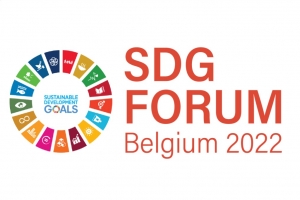PR | Towards the reinforcement of federal ambitions for the circular economy with Zakia Khattabi
On Friday, October 7, the Council of Ministers approved six additional measures to strengthen the 2021-2024 Federal Circular Economy Action Plan. Following the establishment of a new climate governance mechanism and the anchoring of the use of the SDGs (Sustainable Development Goals) as a compass for federal government policy, Zakia Khattabi is currently working on the development of a long-term structural framework for the federal circular economy policy. At the same time, the minister is launching an initiative to determine if, in addition to the collection and treatment of waste, circular product design could also be included in an extended producer responsibility.

Initiated by Federal Environment Minister Zakia Khattabi and Federal Economy Minister Pierre-Yves Dermagne, the Vivaldi Government approved the 2021–2024 Federal Circular Economy Action Plan on December 17 2021. Consisting of 25 concrete measures, this plan aims to foster the creation of quality jobs that cannot be outsourced. In addition It strives to fight climate change, biodiversity loss, degradation and destruction of ecosystems and reduce our dependence on raw materials.
A half-yearly follow-up was agreed: first, to provide an update on the status of the implementation of this action plan; secondly, to enable the various ministers to propose additional measures to this plan.
The Council of Ministers on Friday 7 October approved six new measures, submitted by Khattabi and Gilkinet.
- Measure 1: Review arrangements and propose recommendations for a federal governance structure for the circular economy.
- Measure 2:Evaluate how regional measures under extended producer responsibility can be strengthened by federal product policy
- Measure 3: Improvements to road vehicles.
- Measure 4: modernising railroad car braking systems.
- Measure 5: recycling of recreational boats.
- Measure 6: Analyze how to develop the reuse and recycling of electric vehicle batteries, including bicycles and micromobility.
“The increasing effects of climate change, biodiversity loss, and raw materials scarcity, but also the energy crisis, whose significant impact on households and companies is well known, reminds us in the most forceful way possible that a new economy must be developed.
A circular model as opposed to a linear one, based on the principle of closing the loop for products, services, waste, materials, water and energy is an indispensable step towards bringing our industrial ecosystems closer to the functioning of natural ecosystems," said Federal Environment Minister Zakia Khattabi.
Over the next few months, analysis and mapping will determine whether (and how) federal governance can enable sustainable interaction and collaboration between the pioneers in the field of federal competence in the field of the circular economy and add value to it.
"The mobility and transportation sector poses numerous challenges in this area. The integration of the principle of circularity must be reflected and integrated in the whole production and life cycle of existing and future means of transportation. For this purpose, the circularity of Electric Vehicule batteries is a major issue in the context of the energy transition. I congratulate my colleague from mobility, Georges Gilkinet, for his four initiatives in that regard. A step closer to more sustainable mobility,' concludes the Green Minister.


